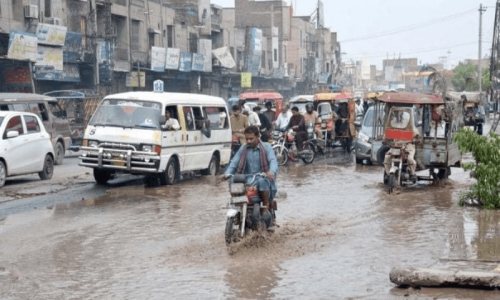PARIS: Nearly 2,000 children die every day from health problems linked to air pollution, which is now the second biggest risk factor for early death worldwide, a report said on Wednesday.
Exposure to air pollution contributed to the deaths of 8.1 million people — around 12 per cent of all fatalities — in 2021, according to the report from the US-based Health Effects Institute.
This means air pollution has overtaken tobacco use and poor diet to become the second leading risk factor for early death, behind only high blood pressure, it said.
Little kids are particularly vulnerable to air pollution, and the institute partnered with the UN Children’s Fund (Unicef) for its annual State of Global Air report. Air pollution contributed to the deaths of more than 700,000 children under the age of five, the report found.
More than 500,000 of those deaths were attributed to cooking indoors using dirty fuels such as coal, wood or dung, mostly in Africa and Asia. “These are problems we know that we can solve,” Pallavi Pant, the Health Effects Institute’s head of global health, said.
‘Profound effects on next generation’
Nearly every person in the world breathes unhealthy levels of air pollution every day, the report found. Over 90 per cent of the deaths were linked to tiny airborne pollutants called PM2.5, which measure 2.5 micrometres or less, it said.
Inhaling PM2.5 has been found to increase the risk of lung cancer, heart disease, stroke, diabetes and a range of other health problems. The report aimed to link the rates of such diseases with air pollution levels.
But despite the “pretty stark” figures, the report could still be underestimating air pollution’s impact, Pant said. It did not take into account how air pollution could affect brain health, neurodegenerative diseases or what impact using solid fuels for heating could have, she explained.
The report also found that ozone pollution — which is expected to get worse as the world warms due to human-driven climate change — was linked to nearly 500,000 deaths in 2021.
“Increasingly, many parts of the world are seeing very short, intense episodes of air pollution,” during events such as wildfires, dust storms or extreme heat, which can drive up ozone levels, Pant said.
There are “very similar solutions” for both climate change and air pollution — particularly reducing greenhouse gas emissions, she added. More can also be done about using dirty solid fuels for cooking indoors, Pant said, pointing to how China had made significant improvements in this area.
More than two billion people cook on basic stoves or over open fires indoors, inhaling the harmful smoke. Partly due to access to cleaner cookstoves, the rate of small children dying from problems linked to air pollution has fallen by more than 50pc since 2000, the report said.
In May, the International Energy Agency announced that $2.2 billion had been pledged by governments and companies to improve access to less deadly cooking methods.
Published in Dawn, June 20th, 2024













































Dear visitor, the comments section is undergoing an overhaul and will return soon.